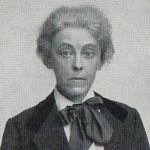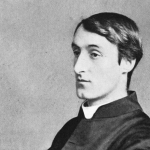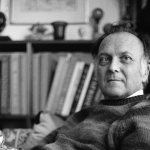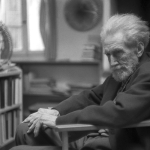An Essay on Man: Epistle II by Alexander Pope

I.
Know then thyself, presume not God to scan;
The proper study of mankind is man.
Plac'd on this isthmus of a middle state,
A being darkly wise, and rudely great:
With too much knowledge for the sceptic side,
With too much weakness for the stoic's pride,
He hangs between; in doubt to act, or rest;
Read Poem Know then thyself, presume not God to scan;
The proper study of mankind is man.
Plac'd on this isthmus of a middle state,
A being darkly wise, and rudely great:
With too much knowledge for the sceptic side,
With too much weakness for the stoic's pride,
He hangs between; in doubt to act, or rest;
0
Epistles to Several Persons: Epistle II: To a Lady on the Characters of Women by Alexander Pope

Nothing so true as what you once let fall,
"Most Women have no Characters at all."
Matter too soft a lasting mark to bear,
And best distinguish'd by black, brown, or fair.
How many pictures of one nymph we view,
All how unlike each other, all how true!
Arcadia's Countess, here, in ermin'd pride,
Read Poem "Most Women have no Characters at all."
Matter too soft a lasting mark to bear,
And best distinguish'd by black, brown, or fair.
How many pictures of one nymph we view,
All how unlike each other, all how true!
Arcadia's Countess, here, in ermin'd pride,
0
Venus and Adonis by William Shakespeare

Even as the sun with purple-colour’d face
Had ta’en his last leave of the weeping morn,
Rose-cheek’d Adonis tried him to the chase;
Hunting he lov’d, but love he laugh’d to scorn;
Sick-thoughted Venus makes amain unto him,
And like a bold-fac’d suitor ‘gins to woo him.
‘Thrice fairer than myself,’ thus she began,
Read Poem Had ta’en his last leave of the weeping morn,
Rose-cheek’d Adonis tried him to the chase;
Hunting he lov’d, but love he laugh’d to scorn;
Sick-thoughted Venus makes amain unto him,
And like a bold-fac’d suitor ‘gins to woo him.
‘Thrice fairer than myself,’ thus she began,
0
Paradise Lost: Book 8 (1674 version) by John Milton

THE Angel ended, and in Adams Eare
So Charming left his voice, that he a while
Thought him still speaking, still stood fixt to hear;
Then as new wak't thus gratefully repli'd.
What thanks sufficient, or what recompence
Equal have I to render thee, Divine
Hystorian, who thus largely hast allayd
The thirst I had of knowledge, and voutsaf't
This friendly condescention to relate
Things else by me unsearchable, now heard
With wonder, but delight, and, as is due,
With glorie attributed to the high
Creator; something yet of doubt remaines,
Which onely thy solution can resolve.
When I behold this goodly Frame, this World
Read Poem So Charming left his voice, that he a while
Thought him still speaking, still stood fixt to hear;
Then as new wak't thus gratefully repli'd.
What thanks sufficient, or what recompence
Equal have I to render thee, Divine
Hystorian, who thus largely hast allayd
The thirst I had of knowledge, and voutsaf't
This friendly condescention to relate
Things else by me unsearchable, now heard
With wonder, but delight, and, as is due,
With glorie attributed to the high
Creator; something yet of doubt remaines,
Which onely thy solution can resolve.
When I behold this goodly Frame, this World
0
The Great Fires by Jack Gilbert

Love is apart from all things.
Desire and excitement are nothing beside it.
It is not the body that finds love.
What leads us there is the body.
What is not love provokes it.
What is not love quenches it.
Love lays hold of everything we know.
The passions which are called love
Read Poem Desire and excitement are nothing beside it.
It is not the body that finds love.
What leads us there is the body.
What is not love provokes it.
What is not love quenches it.
Love lays hold of everything we know.
The passions which are called love
0
Paradise Lost: Book 10 (1674 version) by John Milton

MEanwhile the hainous and despightfull act
Of Satan done in Paradise, and how
Hee in the Serpent, had perverted Eve,
Her Husband shee, to taste the fatall fruit,
Was known in Heav'n; for what can scape the Eye
Of God All-seeing, or deceave his Heart
Omniscient, who in all things wise and just,
Hinder'd not Satan to attempt the minde
Read Poem Of Satan done in Paradise, and how
Hee in the Serpent, had perverted Eve,
Her Husband shee, to taste the fatall fruit,
Was known in Heav'n; for what can scape the Eye
Of God All-seeing, or deceave his Heart
Omniscient, who in all things wise and just,
Hinder'd not Satan to attempt the minde
0
Madeleine in Church by Charlotte Mew

Here, in the darkness, where this plaster saint
Stands nearer than God stands to our distress,
And one small candle shines, but not so faint
As the far lights of everlastingness,
I’d rather kneel than over there, in open day
Where Christ is hanging, rather pray
To something more like my own clay,
Not too divine;
Read Poem Stands nearer than God stands to our distress,
And one small candle shines, but not so faint
As the far lights of everlastingness,
I’d rather kneel than over there, in open day
Where Christ is hanging, rather pray
To something more like my own clay,
Not too divine;
0
The Wreck of the Deutschland by Gerard Manley Hopkins

To the happy memory of five Franciscan Nuns, exiles by the Falk Laws, drowned between midnight and morning of Dec. 7th, 1875 I
Thou mastering me
Read Poem Thou mastering me
0
from The Prelude: Book 2: School-time (Continued) by William Wordsworth

Thus far, O Friend! have we, though leaving much
Unvisited, endeavour'd to retrace
My life through its first years, and measured back
The way I travell'd when I first began
To love the woods and fields; the passion yet
Was in its birth, sustain'd, as might befal,
By nourishment that came unsought, for still,
From week to week, from month to month, we liv'd
A round of tumult: duly were our games
Prolong'd in summer till the day-light fail'd;
No chair remain'd before the doors, the bench
And threshold steps were empty; fast asleep
The Labourer, and the old Man who had sate,
A later lingerer, yet the revelry
Continued, and the loud uproar: at last,
Read Poem Unvisited, endeavour'd to retrace
My life through its first years, and measured back
The way I travell'd when I first began
To love the woods and fields; the passion yet
Was in its birth, sustain'd, as might befal,
By nourishment that came unsought, for still,
From week to week, from month to month, we liv'd
A round of tumult: duly were our games
Prolong'd in summer till the day-light fail'd;
No chair remain'd before the doors, the bench
And threshold steps were empty; fast asleep
The Labourer, and the old Man who had sate,
A later lingerer, yet the revelry
Continued, and the loud uproar: at last,
0
A Letter to Daphnis by Countess of Winchilsea Anne Finch

This to the crown and blessing of my life,
The much loved husband of a happy wife;
To him whose constant passion found the art
To win a stubborn and ungrateful heart,
And to the world by tenderest proof discovers
They err, who say that husbands can’t be lovers.
With such return of passion as is due,
Daphnis I love, Daphnis my thoughts pursue;
Read Poem The much loved husband of a happy wife;
To him whose constant passion found the art
To win a stubborn and ungrateful heart,
And to the world by tenderest proof discovers
They err, who say that husbands can’t be lovers.
With such return of passion as is due,
Daphnis I love, Daphnis my thoughts pursue;
0
A Poem Beginning with a Line by Pindar by Robert Duncan

I
The light foot hears you and the brightness begins
god-step at the margins of thought,
quick adulterous tread at the heart.
Who is it that goes there?
Where I see your quick face
notes of an old music pace the air,
torso-reverberations of a Grecian lyre.
In Goya’s canvas Cupid and Psyche
have a hurt voluptuous grace
bruised by redemption. The copper light
falling upon the brown boy’s slight body
is carnal fate that sends the soul wailing
Read Poem The light foot hears you and the brightness begins
god-step at the margins of thought,
quick adulterous tread at the heart.
Who is it that goes there?
Where I see your quick face
notes of an old music pace the air,
torso-reverberations of a Grecian lyre.
In Goya’s canvas Cupid and Psyche
have a hurt voluptuous grace
bruised by redemption. The copper light
falling upon the brown boy’s slight body
is carnal fate that sends the soul wailing
0
A Channel Crossing by Algernon Charles Swinburne

Forth from Calais, at dawn of night, when sunset summer on autumn shone,
Fared the steamer alert and loud through seas whence only the sun was gone:
Soft and sweet as the sky they smiled, and bade man welcome: a dim sweet hour
Gleamed and whispered in wind and sea, and heaven was fair as a field in flower,
Stars fulfilled the desire of the darkling world as with music: the star-bright air
Made the face of the sea, if aught may make the face of the sea, more fair.
Whence came change? Was the sweet night weary of rest? What anguish awoke in the dark?
Sudden, sublime, the strong storm spake: we heard the thunders as hounds that bark.
Lovelier if aught may be lovelier than stars, we saw the lightnings exalt the sky,
Living and lustrous and rapturous as love that is born but to quicken and lighten and die.
Heaven's own heart at its highest of delight found utterance in music and semblance in fire:
Thunder on thunder exulted, rejoicing to live and to satiate the night's desire.
And the night was alive and anhungered of life as a tiger from toils cast free:
And a rapture of rage made joyous the spirit and strength of the soul of the sea.
Read Poem Fared the steamer alert and loud through seas whence only the sun was gone:
Soft and sweet as the sky they smiled, and bade man welcome: a dim sweet hour
Gleamed and whispered in wind and sea, and heaven was fair as a field in flower,
Stars fulfilled the desire of the darkling world as with music: the star-bright air
Made the face of the sea, if aught may make the face of the sea, more fair.
Whence came change? Was the sweet night weary of rest? What anguish awoke in the dark?
Sudden, sublime, the strong storm spake: we heard the thunders as hounds that bark.
Lovelier if aught may be lovelier than stars, we saw the lightnings exalt the sky,
Living and lustrous and rapturous as love that is born but to quicken and lighten and die.
Heaven's own heart at its highest of delight found utterance in music and semblance in fire:
Thunder on thunder exulted, rejoicing to live and to satiate the night's desire.
And the night was alive and anhungered of life as a tiger from toils cast free:
And a rapture of rage made joyous the spirit and strength of the soul of the sea.
0
Dolores (Notre-Dame des Sept Douleurs) by Algernon Charles Swinburne

Cold eyelids that hide like a jewel
Hard eyes that grow soft for an hour;
The heavy white limbs, and the cruel
Red mouth like a venomous flower;
When these are gone by with their glories,
What shall rest of thee then, what remain,
O mystic and sombre Dolores,
Our Lady of Pain?
Seven sorrows the priests give their Virgin;
But thy sins, which are seventy times seven,
Seven ages would fail thee to purge in,
And then they would haunt thee in heaven:
Fierce midnights and famishing morrows,
And the loves that complete and control
Read Poem Hard eyes that grow soft for an hour;
The heavy white limbs, and the cruel
Red mouth like a venomous flower;
When these are gone by with their glories,
What shall rest of thee then, what remain,
O mystic and sombre Dolores,
Our Lady of Pain?
Seven sorrows the priests give their Virgin;
But thy sins, which are seventy times seven,
Seven ages would fail thee to purge in,
And then they would haunt thee in heaven:
Fierce midnights and famishing morrows,
And the loves that complete and control
0
Locksley Hall by Alfred, Lord Tennyson

Comrades, leave me here a little, while as yet 't is early morn:
Leave me here, and when you want me, sound upon the bugle-horn.
'T is the place, and all around it, as of old, the curlews call,
Dreary gleams about the moorland flying over Locksley Hall;
Locksley Hall, that in the distance overlooks the sandy tracts,
And the hollow ocean-ridges roaring into cataracts.
Many a night from yonder ivied casement, ere I went to rest,
Did I look on great Orion sloping slowly to the West.
Read Poem Leave me here, and when you want me, sound upon the bugle-horn.
'T is the place, and all around it, as of old, the curlews call,
Dreary gleams about the moorland flying over Locksley Hall;
Locksley Hall, that in the distance overlooks the sandy tracts,
And the hollow ocean-ridges roaring into cataracts.
Many a night from yonder ivied casement, ere I went to rest,
Did I look on great Orion sloping slowly to the West.
0
March: An Ode by Algernon Charles Swinburne

I
Ere frost-flower and snow-blossom faded and fell, and the splendour of winter had passed out of sight,
The ways of the woodlands were fairer and stranger than dreams that fulfil us in sleep with delight;
The breath of the mouths of the winds had hardened on tree-tops and branches that glittered and swayed
Such wonders and glories of blossomlike snow or of frost that outlightens all flowers till it fade
That the sea was not lovelier than here was the land, nor the night than the day, nor the day than the night,
Nor the winter sublimer with storm than the spring: such mirth had the madness and might in thee made,
March, master of winds, bright minstrel and marshal of storms that enkindle the season they smite.
II
And now that the rage of thy rapture is satiate with revel and ravin and spoil of the snow,
And the branches it brightened are broken, and shattered the tree-tops that only thy wrath could lay low,
How should not thy lovers rejoice in thee, leader and lord of the year that exults to be born
So strong in thy strength and so glad of thy gladness whose laughter puts winter and sorrow to scorn?
Thou hast shaken the snows from thy wings, and the frost on thy forehead is molten: thy lips are aglow
Read Poem Ere frost-flower and snow-blossom faded and fell, and the splendour of winter had passed out of sight,
The ways of the woodlands were fairer and stranger than dreams that fulfil us in sleep with delight;
The breath of the mouths of the winds had hardened on tree-tops and branches that glittered and swayed
Such wonders and glories of blossomlike snow or of frost that outlightens all flowers till it fade
That the sea was not lovelier than here was the land, nor the night than the day, nor the day than the night,
Nor the winter sublimer with storm than the spring: such mirth had the madness and might in thee made,
March, master of winds, bright minstrel and marshal of storms that enkindle the season they smite.
II
And now that the rage of thy rapture is satiate with revel and ravin and spoil of the snow,
And the branches it brightened are broken, and shattered the tree-tops that only thy wrath could lay low,
How should not thy lovers rejoice in thee, leader and lord of the year that exults to be born
So strong in thy strength and so glad of thy gladness whose laughter puts winter and sorrow to scorn?
Thou hast shaken the snows from thy wings, and the frost on thy forehead is molten: thy lips are aglow
0
A Song for St. Cecilia's Day, 1687 by John Dryden

Stanza 1
From harmony, from Heav'nly harmony
This universal frame began.
When Nature underneath a heap
Of jarring atoms lay,
And could not heave her head,
The tuneful voice was heard from high,
Arise ye more than dead.
Then cold, and hot, and moist, and dry,
In order to their stations leap,
And music's pow'r obey.
From harmony, from Heav'nly harmony
This universal frame began:
From harmony to harmony
Through all the compass of the notes it ran,
Read Poem From harmony, from Heav'nly harmony
This universal frame began.
When Nature underneath a heap
Of jarring atoms lay,
And could not heave her head,
The tuneful voice was heard from high,
Arise ye more than dead.
Then cold, and hot, and moist, and dry,
In order to their stations leap,
And music's pow'r obey.
From harmony, from Heav'nly harmony
This universal frame began:
From harmony to harmony
Through all the compass of the notes it ran,
0
Berryman by W. S. Merwin

I will tell you what he told me
in the years just after the war
as we then called
the second world war
don't lose your arrogance yet he said
you can do that when you're older
lose it too soon and you may
merely replace it with vanity
Read Poem in the years just after the war
as we then called
the second world war
don't lose your arrogance yet he said
you can do that when you're older
lose it too soon and you may
merely replace it with vanity
0
Nosce Teipsum: of Human Knowledge by John Davies

Why did my parents send me to the schools
That I with knowledge might enrich my mind?
Since the desire to know first made men fools,
And did corrupt the root of all mankind.
Read Poem That I with knowledge might enrich my mind?
Since the desire to know first made men fools,
And did corrupt the root of all mankind.
0
Farewell to Matilda by Thomas Love Peacock

Oui, pour jamais
Chassons l’image
De la volage
Que j’adorais. PARNY. Matilda, farewell! Fate has doom’d us to part,
But the prospect occasions no pang to my heart;
No longer is love with my reason at strife,
Though once thou wert dearer, far dearer than life.
Read Poem Chassons l’image
De la volage
Que j’adorais. PARNY. Matilda, farewell! Fate has doom’d us to part,
But the prospect occasions no pang to my heart;
No longer is love with my reason at strife,
Though once thou wert dearer, far dearer than life.
0
